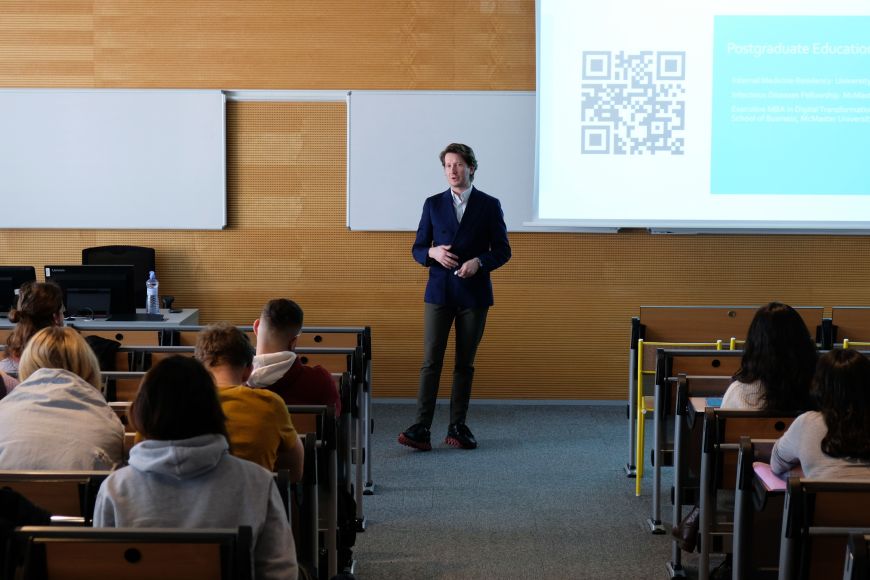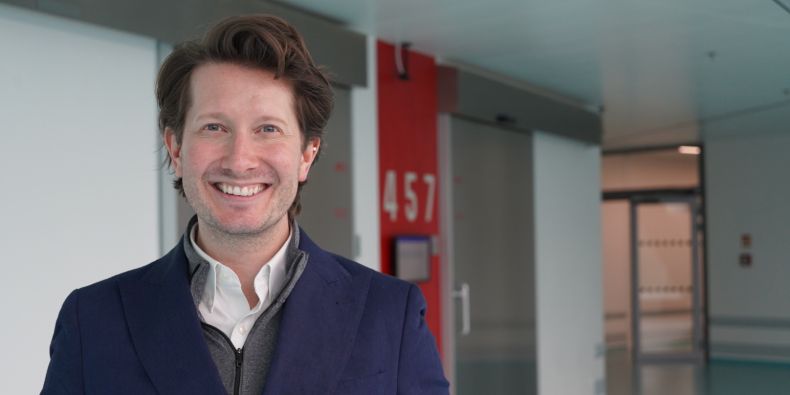He could have studied medicine anywhere in the world, but except for Canada, he only applied to Masaryk University. However, the local medical faculty, half a world away, was not unknown to him - almost every summer as a child, he spent his holidays in the Czech Republic. His dad is from Brno in the Czech Republic, from where he emigrated to Canada in 1968 because of the communist regime. This Czech expatriate moved to Brno for his studies in order to get to know the country of his ancestors better.
“And I don't regret it – my student years in Brno were unforgettable. That's why after ten years, I wanted to return to the places where I studied. It's amazing to see how Brno has changed and how many restaurants and cafes have been added. I was also enthusiastic about the transformation of the faculty and especially the newly built MU Simulation Centre, for which I really envy the students. I also got the chance to speak in a special lecture to students considering specialising in infectious diseases and working in Canada. They had a lot of interesting questions and I'm glad I was able to meet them and talk about my work,” Dale elaborates on the agenda for his visit.

At the beginning of his studies at MU, Dale would not have expected to specialize in infectious diseases. And he certainly wouldn't have believed that his work would make him one of the public faces of Canadian health care. But then, at the beginning of the pandemic, he was approached by CBC Radio for an interview and later, several television news channels such as CTV. Since then, Canadians have seen him on their TV screens almost daily as an infectious disease expert.
“Speaking to the media about the pandemic was a great opportunity to help my community. I was comfortable in doing so because of my previous experience in public speaking as president of the MIMSA student association. However, at first, it was not easy for me to talk about coronavirus in simple language that everyone could understand. But I picked it up pretty quickly. I also had to study a lot of information, which was part of my job anyway – at the time, I was working as the Medical Director of Infection Prevention and Control at Joseph Brant Hospital, based in Burlington. Finding the time to do everything was quite challenging for me, because on top of all that, I was also taking care of infectious diseases patients, of which we had thousands in the clinic,” Dale explains.
He said the pandemic period was one of the most difficult times in his life, as he spent more than 15 hours a day at work. He said the worst was the first wave of the pandemic, when little was known about the coronavirus and as a result there were severe restrictions. For example, some families could only say goodbye to their loved ones via an internet call because of safety precautions. Experiencing hundreds of such goodbyes was overwhelming for him, so after two difficult years full of dying patients and threatening e-mails from opponents of coronavirus and vaccination, he had to take six months to recover from the difficult period.
MU graduate helped hospital launch virtual clinic, today they have hundreds of patients
However, he still loves his profession and is glad he chose to specialise in infectious diseases during a three-year core Internal Medicine Residency in Saskatoon, Saskatchewan. He continues to find many new and interesting things in his daily work, and the field of infectious diseases continues to fascinate him even after years of practice, which was one of the main criteria for choosing his speciality.
“Fortunately, my job is no longer just about the pandemic and I can help patients with the treatment of other infectious diseases. For example, it gives me great joy when I can help a patient with the treatment of hepatitis or HIV. Or when I can teach a patient the best way to prevent diabetic foot infections so that they can walk for many years without limitation. Making people's lives better is what I love most about my job,” Dale explains.
With the pandemic demanding less of his time, he also finally has the space to focus more on the virtual clinic that Joseph Brant Hospital launched a few months before the pandemic began. The new concept of treating patients allows them to have check-ups virtually, which seniors or people living in remote parts of Canada especially appreciate, not having to make the difficult commute to the hospital. All they have to do is meet with a doctor via video call, or contact them via a chat app, or find out information about their health using an electronic system.
“Starting a virtual clinic is a big challenge, but I believe that the combination of physical and virtual treatment is the future of medicine. Of course, a virtual clinic cannot replace a traditional medical examination, but combining both is ideal. We run the clinic with the support of physicians, nurses, wound care specialists and administrative staff three times a week. We already have hundreds of patients who are very complimentary about our services, so I see great meaning in my work,” Dale explains.
